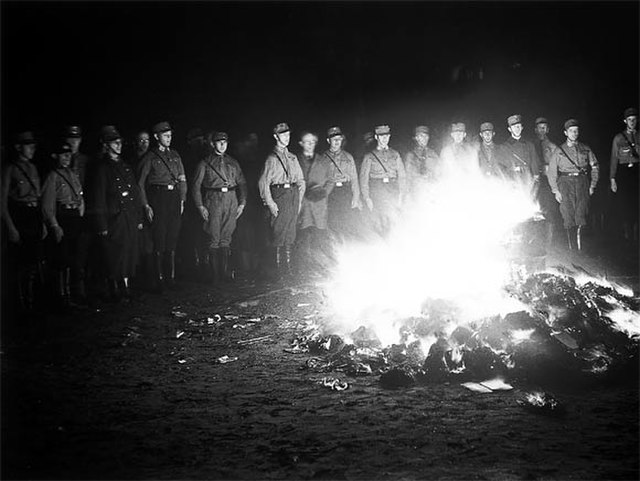Nicholas Johnson
The Gazette, August 24, 2022, p. A6
At least some Americans may be slowly awakening to the demise of their democracy.
As Abraham Lincoln said in 1838, and others emphasized since, “At what point then is the approach of danger to be expected? I answer, if it ever reach us, it must spring up amongst us. It cannot come from abroad. If destruction be our lot, we must ourselves be its author and finisher. As a nation of freemen, we must live through all time, or die by suicide.”
Well, it has now “sprung up amongst us.”
As a stew is the result of its ingredients, so is a democracy the result of the civic organizations and institutions that support its shaky structure: a courageous, trusted mass media; a wise, respected non-partisan judiciary; citizens who vote and honorable officials who count those votes.
Central is the cluster of efforts to prepare all citizens to be their own governors. Elections. Public schools. First Amendment protections and reduced postal rates for newspapers and books. Local and national elections. The roads and rail to turn “e pluribus” into “unum.”
And public libraries.
Although the Nazis’ book burnings are perhaps the most notorious, authoritarians have been burning books for 2,000 years. [Photo: Book burning in Nazi Germany, 1933; source: Wikimedia commons]
The U.S. is no exception. When the British burned the 3,000 books in the Capitol during the War of 1812, Thomas Jefferson offered to sell the Congress his near-7,000 book library. Because Federalists argued his books would spread his “infidel philosophy,” the appropriation to buy them only passed by a narrow margin along party lines. Sound familiar?
Forcing librarians to leave, and a library to close, while less dramatic than book burning, produces the same result. As it did in Vinton, Iowa, earlier this year – even though Americans overwhelmingly oppose removal of books from libraries (70 percent Republicans, 75 percent Democrats). [Photo: Vinton, Iowa, public library; source: https://www.vinton.lib.ia.us/about/library-history]
Libraries have been a part of Homo Sapiens’ culture since our agricultural age. One of the first, in the seventh century BC, well before Dewey decimal classification, held 30,000 cuneiform tablets organized by topic.
Not surprisingly, it was political organizing by members of women’s clubs that led the establishment of 75-80 percent of U.S. libraries in the late 1800s and early 1900s.
In 1896 the Cedar Rapids Federation of Ladies Literacy Clubs generated enough public pressure for a library that the City Council scheduled a vote. Iowa was then one of two states that allowed women to vote on limited tax issues, including libraries.
It was approved by 59 votes (1,105 to 1,046).
The Gazette reported that “Had it not been for the efforts of the women themselves who voted in every ward in the city, the proposition would undoubtedly have been lost” – noting that half the men who voted didn’t bother to vote on the library proposal.
Today’s Iowa public libraries, and their personnel, still offer books and “information desks,” but oh, so much more. Never have they been more essential if our democracy is to “live through all time.”
__________
Nicholas Johnson was a Presidential Advisor, White House Conference on Libraries and Information Services, 1979 Contact mailbox@nicholasjohnson.org
Lincoln on “approach of danger.” Abraham Lincoln, “The Perpetuation of Our Political Institutions,” Springfield, Young Men’s Lyceum, Jan. 27, 1837, “Report of Address Before the young Men’s Lyceum of Springfield, Illinois, 27 January 1838,” Roy P. Basler, ed., The Collected Works of Abraham Lincoln, Rutgers University Press, 1953, https://papersofabrahamlincoln.org/documents/D200130
Nazi book burning. Michael S. Roth, “How Nazis destroyed books in a quest to destroy European culture,” Washington Post, Feb. 24, 2017, https://www.washingtonpost.com/opinions/how-nazis-destroyed-books-in-a-quest-to-destroy-european-culture/2017/02/24/244aee94-cdf3-11e6-a87f-b917067331bb_story.html Photo on Wikimedia commons: On Wikimedia commons: https://upload.wikimedia.org/wikipedia/commons/thumb/b/b4/Joseph_Schorer_B%C3%BCcherverbrennung_1933.jpg/640px-Joseph_Schorer_B%C3%BCcherverbrennung_1933.jpg
“Book Burning,” Holocaust Encyclopedia, U.S. Holocaust Memorial Museum, https://encyclopedia.ushmm.org/content/en/article/book-burning
Authoritarians burning books. “Book Burning, 213 BC-2011 AD,” University of Wisconsin-Milwaukee, https://uwm.edu/libraries/burnedbooks/ (“Since ancient times, people from virtually all religions and societies have burned books as a form of censorship, protest, or hate mongering. … Tyrants throughout history -- from Imperial China to Stalin to the Khmer Rouge to Castro -- have attempted to preemptively quell sedition by eliminating subversive texts from the population.”)
Jefferson’s library. “Sale of Books to the Library of Congress (1815),” Monticello, https://www.monticello.org/research-education/thomas-jefferson-encyclopedia/sale-books-library-congress-1815 (“Jefferson's offer was met by warm support from many in the House and Senate; still, the bill introduced to authorize the purchase of Jefferson's library faced congressional opposition, particularly from the Federalists, such as Cyrus King, who argued that Jefferson's books would help disseminate his "infidel philosophy" and were "good, bad, and indifferent ... in languages which many cannot read, and most ought not."[3] The bill finally passed with a narrow margin along party lines.[4]”
Vinton library. Gage Miskimen, “With another leader leaving, Vinton Public Library closes for now; Library lost 2 directors in 2 years amid resident complaints,” The Gazette, July 9, 2022, https://www.thegazette.com/news/with-another-leader-leaving-vinton-public-library-closes-for-now/ (“The library board met Tuesday to accept the resignation of Colton Neely, the interim director. … Most recently departing the library before Neely was Renee Greenlee, its director for six months. … Vinton also saw another director, Janette McMahon, resign in July 2021. … McMahon previously told The Gazette that she received complaints about children’s books on display, including “Joey,” written by first lady Jill Biden, and “Superheroes Are Everywhere” by Vice President Kamala Harris. She said some residents argued the library should have more books about former Republican President Donald Trump on display. “I can’t buy what doesn’t exist, and there weren’t quality books about Trump.”)
Gage Miskimen, “Two directors quit Vinton library after complaints about hirings, LGBTQ and Biden books,” The Gazette, June 20/July 10, 2022, hegazette.com/news/two-directors-quit-vinton-library-after-complaints-about-hirings-lgbtq-and-biden-books/
Gage Miskimen, “Vinton Library to Reopen Monday with Limited Hours,” The Gazette, July 15, 2022, p. A1 (“Previous directors left for other jobs amid city resident complaints about the library’s display of LGBTQ books and books about Democratic President Joe Biden and Vice President Kamala Harris.”)
Opposition to book removal. American Library Association, https://www.ala.org/advocacy/fight-censorship (“Large majorities of voters (71%) oppose efforts to have books removed from their local public libraries, including a majority of Democrats (75%), independents (58%), and Republicans (70%). Most voters and parents hold librarians in high regard, have confidence in their local libraries to make good decisions about what books to include in their collections, and agree that libraries in their communities do a good job offering books that represent a variety of viewpoints. Hart Research Associates and North Star Opinion Research on behalf of the American Library Association among 1,000 voters and 472 parents of children in public school. The survey was conducted March 1 to 6, 2022, and the sample is demographically and geographically representative of U.S. voters and parents.”)
History of Libraries. Don Vaughan,” A Brief History of Libraries,” britanica.com, https://www.britannica.com/story/a-brief-history-of-libraries (“The library concept dates back millennia. The first systematically organized library in the ancient Middle East was established in the 7th century BCE by Assyrian ruler Ashurbanipal in Nineveh, in contemporary Iraq. It contained approximately 30,000 cuneiform tablets assembled by topic.”)
Dewey Decimal Classification, Wikipedia, https://en.wikipedia.org/wiki/Dewey_Decimal_Classification
Women and libraries. Carnegie Library, Wikipedia, https://en.wikipedia.org/wiki/Carnegie_library (“Beginning in 1899, Carnegie's foundation funded a dramatic increase in the number of libraries. This coincided with the rise of women's clubs in the post-Civil War period. They primarily took the lead in organizing local efforts to establish libraries, including long-term fundraising and lobbying within their communities to support operations and collections.[5] They led the establishment of 75–80 percent of the libraries in communities across the country.[6]”)
“Our History,” Cedar Rapids Public Library, https://www.crlibrary.org/our-history/ (“While women could not vote generally, in 1894, Iowa became one of only two states to pass legislation allowing women to vote on limited tax issues, including library levies. The City Council put the matter to a public vote on March 2, 1896. The results were 1,105 votes yes to 1,046 no. The library was approved by just 59 votes. The Gazette reported returns showed half the men who voted didn’t vote on the question at all, and speculated the vote may be challenged on the grounds that ‘the women are illegal.’ “Had it not been for the efforts of the women themselves who voted in every ward in the city, the proposition would undoubtedly have been lost,” the article said. The mayor asked Van Vechten to choose the new library’s first Board of Trustees. The four women and five men of the new board elected Van Vechten their president. The Gazette dubbed her “the mother of the library.”)


No comments:
Post a Comment